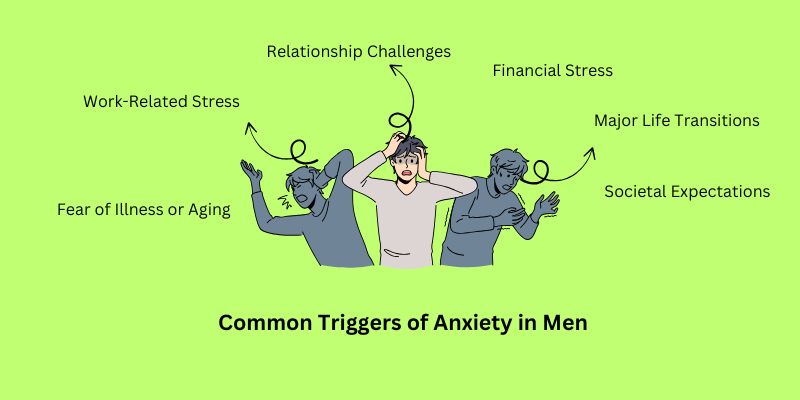Anxiety doesn’t discriminate, but the pressures that men face often create unique triggers that can go unnoticed. Society sometimes expects men to be strong, stoic, and resilient, leaving little room for emotional vulnerability.
This expectation, combined with life’s demands, can lead to a buildup of stress and anxiety that many men find challenging to express or address.
In this article, we’ll explore the common triggers of anxiety in men, how it may manifest differently, and actionable strategies to manage and cope effectively.
Common Triggers of Anxiety in Men
Anxiety in men can stem from a variety of sources, often influenced by societal, personal, and biological factors. Here are some of the primary causes:

1. Societal Expectations and Masculinity Pressures
- Pressure to “Man Up”: Many men grow up believing that showing emotions or seeking help indicates weakness. This can lead to bottled-up feelings, causing anxiety.
- Stigma Surrounding Vulnerability: Men are often expected to solve problems independently, discouraging them from opening up about their struggles. This need to appear “emotionally strong” can create a cycle of internalized stress.
2. Financial Stress
- Responsibility to Provide: Men frequently feel pressure to ensure financial stability for themselves and their families. Concerns over job stability, debt, and retirement planning can lead to significant anxiety.
- Career Pressures: Financial success is often tied to self-worth, and failure to meet financial or career expectations can be a significant source of worry.
3. Relationship Challenges
- Fear of Failure in Relationships: Many men fear disappointing their partners, families, or friends. Anxiety may arise from the pressure to be a “good” partner, parent, or friend.
- Communication Struggles: Difficulty expressing emotions or engaging in deep conversations can lead to misunderstandings, fueling relationship-related anxiety.
4. Work-Related Stress
- Performance Expectations: Men often feel compelled to meet high productivity standards and excel professionally. The pressure to secure promotions or compete in demanding environments can increase anxiety.
- Workplace Dynamics: Navigating workplace relationships or dealing with difficult colleagues can create additional stress, particularly in competitive fields.
5. Health Concerns
- Fear of Illness or Aging: Concerns about physical health, fitness, and aging can contribute to anxiety, particularly as men get older.
- Mental Health Stigma: Men may avoid acknowledging or seeking help for mental health concerns, fearing judgment or feeling like they should “tough it out.” This avoidance can worsen anxiety.
6. Major Life Transitions
- Significant Changes: Life changes like marriage, parenthood, relocation, or career shifts bring a sense of uncertainty, which can trigger anxiety.
- Fear of the Unknown: Adjusting to new responsibilities or environments can feel overwhelming, particularly when societal pressures to “have it all together” remain strong.
7. Social Pressures and Comparisons
- Lifestyle Expectations: Men may feel pressured to maintain a specific lifestyle or achieve societal milestones, creating stress around meeting external expectations.
- Social Media Comparisons: Constant comparison on social media can exacerbate feelings of inadequacy and lead to heightened anxiety about personal progress or appearance.
How Anxiety Manifests in Men

Men often express anxiety differently than women, which can make it harder to recognize. Here are common ways male anxiety can present:
- Irritability or Anger: Men may react to anxiety with irritability, frustration, or even anger, masking deeper feelings of stress.
- Withdrawal and Avoidance: Some men may withdraw from social settings, avoid discussing their feelings, or distance themselves from loved ones.
- Physical Symptoms: Anxiety in men can also present as physical symptoms, including a racing heart, restlessness, muscle tension, or digestive issues.
- Maladaptive Coping Mechanisms: To manage anxiety, some men turn to substances like alcohol or drugs or distract themselves by overworking, which can worsen their mental health over time.
Recognizing these behaviors as symptoms of anxiety, rather than character flaws, can help loved ones better support the men in their lives.
Strategies to Cope With Male Anxiety
Managing anxiety effectively requires a combination of awareness, proactive strategies, and, when necessary, professional help. Here are some approaches to help manage male anxiety:
https://www.instagram.com/reel/C2fVkNXOZb0/?utm_source=ig_web_button_share_shee
1. Build Awareness
- Recognize Triggers: Encourage men to identify situations or patterns that increase their anxiety. Keeping a journal to note these moments can help raise self-awareness.
- Acceptance: Accepting that anxiety is a natural and manageable experience is crucial. Reframing it as a common human response rather than a weakness can lessen self-criticism.
2. Stress Management Techniques
- Mindfulness and Grounding: Practices like meditation, deep breathing, or grounding exercises (such as the 5-4-3-2-1 technique) help calm the mind and body during anxious moments.
- Regular Exercise and Balanced Diet: Physical activity reduces stress and improves mental health, while a nutritious diet supports overall well-being. Aim for at least 30 minutes of exercise most days.
- Prioritize Sleep: Quality sleep is essential for mental health. Encourage routines that promote consistent, restful sleep.
3. Open Communication
- Talk to Trusted Individuals: Encourage men to share their feelings with someone they trust, whether it’s a friend, family member, or partner. Sometimes just expressing thoughts aloud can bring relief.
- Journaling: Writing down thoughts and concerns can be a helpful outlet for processing emotions and reducing stress.
4. Seek Professional Help
- Therapy and Counseling: Cognitive Behavioral Therapy (CBT) and mindfulness-based therapies are effective for managing anxiety. A therapist can provide tools for navigating triggers and reframing negative thoughts.
- Support Groups: Connecting with others facing similar struggles can reduce feelings of isolation and create a sense of community.
- Online Counseling: For those who feel uncomfortable with in-person therapy, online counseling platforms offer accessible, confidential support.
Breaking the Stigma Around Male Anxiety
One reason men hesitate to address anxiety is the stigma around male vulnerability. Here’s why it’s important to challenge this stigma:
- Encourage Open Dialogue: Conversations around mental health should be normalized. Discussing emotions openly can make it easier for men to seek support and feel less isolated.
- Share Success Stories: Mental health advocates and public figures who share their journeys with anxiety can help destigmatize it, providing men with relatable examples of resilience and recovery.
- Highlight Mental Health Resources: Organizations like Mental Health America, the National Alliance on Mental Illness (NAMI), and HeadsUpGuys offer resources specifically for men.
Normalizing male anxiety and encouraging men to seek help fosters a culture of support and understanding, making it easier for men to prioritize their mental health.
Conclusion
Anxiety in men may be triggered by societal pressures, personal challenges, and biological factors, but it is a manageable condition with the right support and tools. Recognizing these triggers, understanding how anxiety manifests, and implementing coping strategies can create a path toward relief and resilience.
Remember, taking the first step to address anxiety is a sign of strength, not weakness, and prioritizing mental well-being opens doors to a healthier, more balanced life. Whether you’re supporting a loved one or facing your own anxiety, there is hope and help available.



